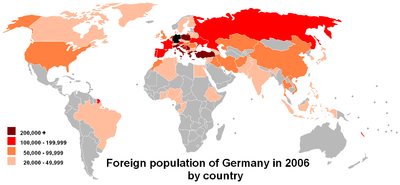Immigration to Germany

On 1 January 2005, a new Immigration Law came into effect that altered the legal method of immigration to Germany. The practical changes to the immigration procedures and limitations were relatively minor. Traditionally, Germany has not considered itself a country with a need for large numbers of immigrants and has limited entry accordingly.
Immigrating to Germany as a non EU-citizen has not become easier under the new law as it continues to limit the recruitment of foreign employees. This limitation applies most particularly to unskilled or semi-skilled employees. In order to obtain a work permit one must demonstrate a justified individual need or public interest in the employment. Without a concrete job offer one has almost no chance of getting a residence permit. Different rules apply to refugees, asylum seekers, EU citizens, family members of German citizens, and close relatives of individuals already living in Germany.

Thereafter, the prospective employer has to announce this engagement to the employment centre (Arbeitsagentur). The “Arbeitsagentur” only agrees to issue a residency permit if there is no German or otherwise privileged foreign employee available for the employment.
However, like many European countries, Germany does offer a program for highly skilled immigrants. Unlike many European countries, the standards are far more stringent. Although the determination is still based on the applicant demonstrating educational qualifications, expertise in a particular area, or a salary above a certain level, the processes in place make it extremely difficult to receive a work permit. Currently, the minimum salary is set at 85,500 € p.a.[1]. Austria's income threshold is half of that.[2] Despite efforts from both major parties, they've been unable to find a compromise that would make the process easier.
Self-employed people can get a residence permit, so long as the government finds that the job would fulfill a superior economic interest, fulfill a regional need, or have an expected net positive effect on the economy. Furthermore, the sponsor must guarantee the financing. Once an immigrant has met those requirement, an indivudual inquiry will take place as to whether a German citizen or preferred immigrant could perform the same job function. As a general rule these requirements will be assumed if at least ten jobs will be created and 1 million € invested. The assessment of the requirements will conform to the quality of the business idea, the entrepreneurial experience of the applicant, the capital expenditure, the effects on employment and out–of–school education, and the contribution to innovation and research. A residence permit to work self-employed could also be issued, if there are mutual benefits according to international law. After three years one may apply for and receive a permanent residence permit “Niederlassungserlaubnis”, so long as the planned idea is put into practice successfully and one's livelihood is secured.
Foreign students can stay for one year after a university degree in order to find a job matching their qualifications.
References
- ^ "Work permits". Der Spiegel. Retrieved 2007-05-20.
- ^ "Austrian Law Regarding Work Permits" (PDF). Austrian Govt. Retrieved 2007-06-01.
